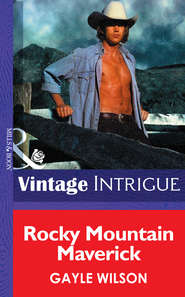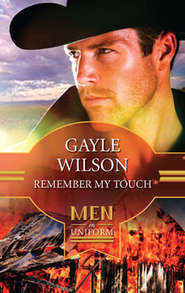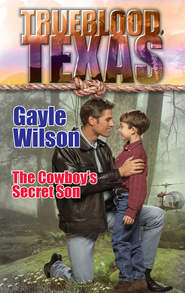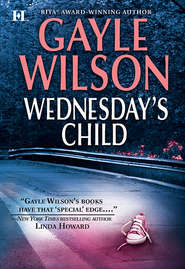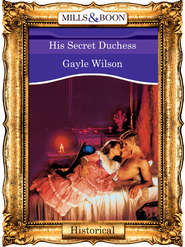По всем вопросам обращайтесь на: info@litportal.ru
(©) 2003-2024.
✖
Raven's Vow
Настройки чтения
Размер шрифта
Высота строк
Поля
Although, through visible effort, Catherine had managed to control her lips, her eyes were still laughing. They were deep amber in the morning light, darkened with flecks of the same rich auburn that gleamed in her hair, which was almost hidden under the modish hat that matched the dark green habit she wore. The garment, although cut very fashionably, was relatively free of decoration, designed for riding, Raven was pleased to note, rather than parading.
His eyes answered the amusement in hers, and for a moment a decided jolt of power from their crystal depths curled upward inside her body, fluttering against her heart. Catherine swallowed suddenly, dropping her gaze to her gloved hands that were perfectly relaxed over the reins. There was a moment of silence, and then she once more directed her mare onto the bridle path she’d been following before she’d paused to admire the stallion. Long before she had recognized the rider.
Taking that for permission to join her, Raven guided the black alongside, and they rode without speaking for a while.
“He’s magnificent,” she said finally. Surely horses were a safe topic and apparently one they both appreciated.
“He’s a brute with an iron mouth and a heart as black as his hide,” Raven answered without a. trace of annoyance, “but we’re beginning to understand one another.”
“Then you haven’t had him long?” There was no evidence of anything but perfect understanding between horse and rider. If the black was a brute, he was keeping his temperament hidden.
“Since this morning,” Raven said calmly.
“This morning?”
“Tattersall’s, I believe, is the name of the establishment where I found him.”
“But…” She paused, glancing at that dark face to see if he were teasing her.
Raven turned at her hesitation and met her eyes, his brows raised slightly, questioning her surprise.
“It must be…it’s barely daybreak,” she finally managed to say.
“I needed a horse,” Raven said, as if that explained it all.
“They aren’t open this early,” she persisted.
“They are today,” he assured her. Then, closing the subject of the power of his money, a subject he had never intended to open, but which had just been demonstrated, Raven asked, “Would you like a run? I haven’t had a chance to see if he lives up to the promise of his looks or if he’s all flash and no substance.”
“Here?” she asked, looking at the narrow, tree-lined path.
“Is there arule against it?” he questioned, almost mocking.
“Probably,” she answered tartly, but even as she said it she touched the mare with her crop.
Catherine had caught him by surprise and was therefore able to maintain her lead for a short distance, but, of course, they both had known that the black had a decided advantage, by size if by nothing else. She was forced to admit that his rider also had an edge. Although she was widely acknowledged as one of the finest equestrians in the ton, John Raven seemed to be one with his horse, blending with the reaching effort of the black and almost adding energy to the stallion’s powerful motion.
Recognizing defeat and feeling nothing but admiration for the pair who had beaten her, she slowed Storm until eventually they were moving again side by side, at a pace that almost demanded conversation.
“Is this where you always ride?” Raven asked, thinking with sympathy how constricted the area was for a horsewoman of her skills. He wished they could race over the vast lowlands along the great river called Mississippi, space and time unlimited.
Catherine wondered if the American was planning on joining her each morning. She had been forced in the past to give some sharp setdowns to suitors who believed she would welcome company on her early morning excursions. She did occasionally allow very old and trusted acquaintances like Reggie to join her, because she could be sure that they would fall in with any suggestion she made as to the speed or duration of the ride. But, except for her groom, following behind, this was a private time.
“It’s the only place in London for a gallop.”
“A gallop,” Raven repeated derisively. “If that’s what you call a gallop.”
“No, it isn’t, of course. But there’s really nowhere else. Thisis a town, you understand—streets, houses, people.”
“We have towns in America,” he answered, and she knew he was laughing at her again. His face didn’t reflect his amusement, of course, but he was laughing just the same.
“And in which one do you live?” she asked sweetly. She tried to dredge up the names of some of those distant cities. New York and Washington. Boston. And Baltimore, of course.
“I haven’t been home in several years,” Raven answered.
“I thought you’d only recently come to England.”
“There are other parts of the world besides England.”
“And in which parts were you?” she asked almost sharply. She didn’t know how he could make her feel so provincial. He was the one who should be aware that he was lacking polish, and instead, when they were together, she ended up feeling very much out of control of the situation. That had never before happened to her where men were concerned.
“China and then India. For the last five years,” he said.
Images of the East as she imagined it to be floated through her consciousness. The old lures of silks and spices. Jewels and precious metals. Ivory and drugs.
“Is that where—” She broke off, realizing the rudeness of her question.
“Where I acquired my money?” he finished easily. “I told you that you might ask me anything. There’s no reason to guard your tongue with me. Most of it came from the East, but I have interests in America also.”
“What kind of interests?”
“Shipping, which led naturally to my contacts in the Orient. I became fascinated by the cultures. And there, too, fortunes were to be made.”
“Too?” she repeated.
“As there will be here.”
“In coal and railroads?” she said, remembering.
“And in iron and steel. For the machines.”
“What machines?”
“All of them,” he said, his lips flickering upward. “Machines for everything,” he offered, wondering if she could really be interested.
“I don’t understand.”
“The world is changing. What has been man-made is about to become the province of machines. To build machines, there must be iron. And to make iron…” He paused, glancing at her face.
“There must be coal,” she repeated, as if it were a lesson she’d learned. As indeed, she had. “And the railroads?” she asked. “Why are you building railroads from your coalfields?”
“Because to make iron you must bring the coal and the ore together. The iron ore. So I buy the coalfields, employ the power of machinery to improve the mining techniques, and eventually I’ll carry the coal to the foundries by rail,” he explained patiently.
“But won’t that take a long time? To build railroads from the mines?”
“Yes, but the process can be speeded up by the cooperation of the men who matter in this country. Or it can be slowed down by their refusal to cooperate.”
“And that’s why-”






